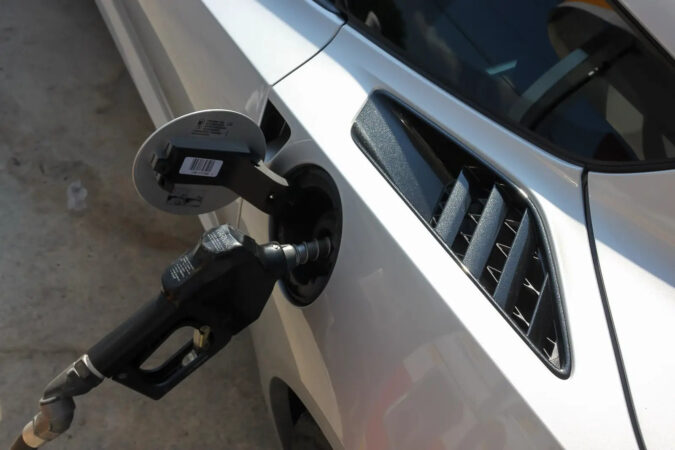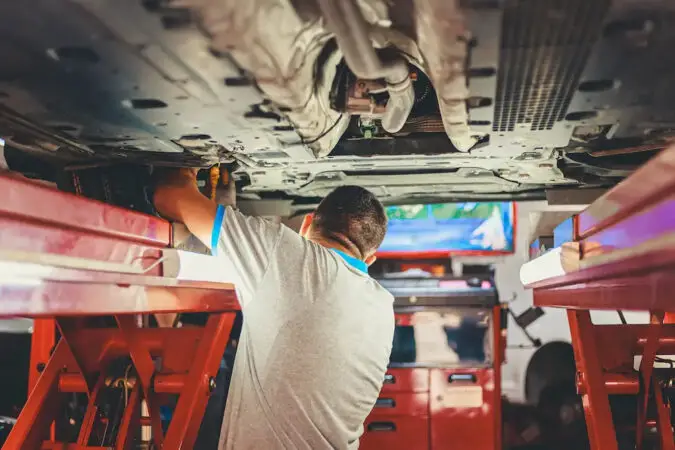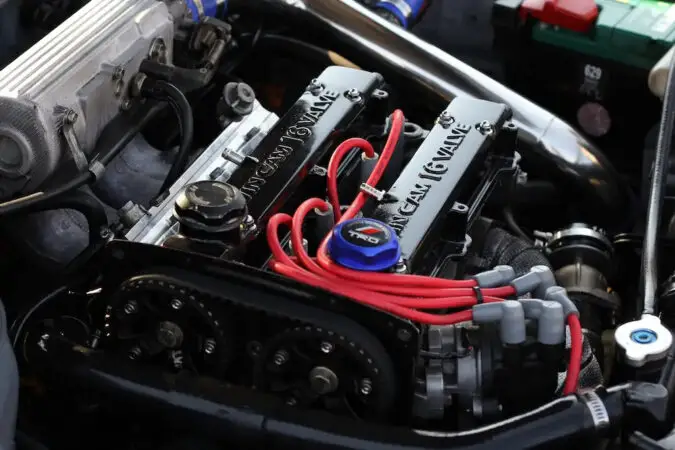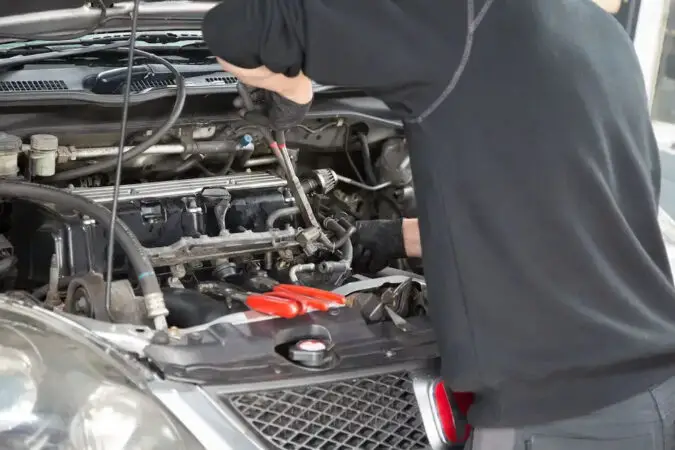Suspect you have a gas leak in car? But having trouble spotting them? A gas leak in car can come from various places. And regardless of where the leak is, it’s a serious issue that can potentially harm both the car and your health.
That’s the bad news. The good news is that we’re here to help you find the problem and help you understand the solutions. In some cases, it’s easy to find and you can fix it quite easily yourself. But there may be instances where you’ll need to go to a professional and spend quite a bit of money.
In any case, we’re here to help you solve the gas leak in car issue. Here’s a table of content to help you find the information you need:
Gas Leak In Car Possibility #1: Gas Tank
We start with the obvious possibility: the gas tank. Since this is where the car stores the gasoline, it’s one of the main suspects for a gas leak in car. However, we believe this is also the least likely culprit unless you drive a very old car, or a beater car.
Gas tanks are typically made either of metal with a tin-lead coating, or HDPE (High-Density Polyethylene), which is a fancy word for very durable plastic. The latter is the more popular option in modern cars.
However, both gas tanks are very durable. Both will last about 10 years, often surpassing that estimated lifespan—especially for HDPE. I owned cars that are over 10 years old multiple times now, and none of them have ever had any gas tank leak issues.
Of course, that doesn’t mean that won’t happen to you. Especially with metal gas tanks, as they can corrode over time. In any case, take a look underneath your car and see if you can spot the gas tank from there. Unfortunately, some cars—especially modern ones—have their gas tank concealed a little higher up, sometimes with an underfloor in the way.
In any case, check for traces of gasoline and/or gas smell around the area. If you find either one of those, and your gas tank is concealed, might be time to visit a professional and have them inspect it.
Gas Tank Repair
Okay, so let’s say you have a leaky gas tank. What are your options here? Well, in some cases you may be able to get away with just sealing and repairing it. If you have a metal gas tank, this may involve welding it or using a fuel tank repair kit.
A fuel tank repair kit typically costs less than $13 per pack, although heavy-duty ones may cost more. And this will typically only work with leaks that are less than 1 inch larger. For larger leaks on metal tanks, you may be able to weld them.
However, welding a gas tank is an extremely dangerous process as you may ignite the fuel vapors in the process. Additionally, welding them will likely require the technician to remove the gas tank from the car, which will take time and adds to the cost.
Because of this, you’re probably better off replacing the fuel tank altogether. It will be quite expensive, as the gas tank itself can cost up to $800. Whereas labor can add anywhere between $100 to $400 to the total cost. On average, expect a total bill of between $800 to $1,200 for most cars.
Gas Leak In Car Possibility #2: Fuel Lines
This we think is the more likely culprit, especially if your car doesn’t have any underfloors. The lack of underfloors means the components underneath your car are exposed, meaning there’s a higher chance of damage from road debris.
The fuel line is a hose that delivers fuel from your gas tank to the engine. Most carmakers now use nylon for these hoses, but some may use plastic, rubber, or braided rubber hoses. In any case, they can wear out over time. Or if you’re unlucky, road debris may have struck your fuel line causing them to rupture, and resulting in a gas leak.
Check this by locating the fuel lines underneath your car, and see if any of them has ruptured. You may need to turn on the engine to see the leak so that the car pumps the fuel through the line. Needless to say, keep anything that may create a spark far away while you’re checking the fuel line.
As mentioned, some cars may have an underfloor, in which case you’ll need to remove them to check the fuel line. This may or may not be a difficult process, and you may need to go to a professional. A diagnosis will typically cost $65 to $100 for most cars.
Note that the fuel line runs all the way to the engine, as it has to feed the fuel injectors. Check if there’s a leak around the fuel line in the engine. And yes, bad injectors can also cause a leak. We’ll discuss this later, but now, what’s the cost to replace fuel lines?
Cost To Replace Fuel Lines
The cost to replace the fuel line varies greatly depending on your car’s make and model. As different cars use different materials, it’s hard to make an estimate. But here’s the good news: the fuel line typically has several connections. Instead of replacing the entire system, you can probably get away by simply replacing the leaky section.
Note that an official dealer will sometimes require you to replace the entire system, making them the more costly option. But if you go to an independent shop, you can ask them to replace the leaking section to save some money.
Minor leaks will cost around $120 to repair, while larger leaks or a replacement line may cost up to $300. But a total fuel line replacement can cost up to $500, depending on your car’s make and model.
The other good news is that you can save some money by replacing the fuel line yourself. The video above is a great example of how to change a steel fuel line in your car.
Note that this is an intermediate-level DIY job, and we understand that many of you may not be comfortable with doing this yourself. If this is the case, you should leave it to the professionals to ensure a proper fitting of the new fuel line.
We recommend asking your official dealer if they can replace the leaky section rather than the entire system. Afterward, compare prices with independent shops to make sure you get the best deal. If you don’t already have a trusted repair shop or mechanic, Consumer Reports has a great guide to help you find one.
Gas Leak In Car Possibility #3: Fuel Injectors
Finally, if you don’t see any leaks or puddles of gasoline underneath your car, check your fuel injectors. As the name suggests, this component injects gasoline into the engine during operation. As with any engine components, they can wear out over time.
Fuel injector leaks may happen at the nozzle, the o-rings, or more rarely, its body. In any case, it will likely cause performance issues and possibly trigger a check engine light. This is because the leak—regardless of where it’s leaking from—will cause an improper amount of fuel to be fed to the engine.
Since an engine requires a specific amount of fuel to operate (slightly leaner than the stoichiometric ratio is the norm), a faulty injector can cause multiple problems. Oh, and if it’s an external leak, this is a serious fire hazard. Gasoline can leak out, dripping onto hot parts of the engine and a fire can start.
An injector leak should be relatively easy to check as the injector body, or the area surrounding it should be wet with fuel. Although in modern cars you’ll need to remove the plastic engine cover before you can inspect the injectors.
The fuel injectors can last anywhere between 50,000 to 100,000 miles before it fails. However, this is an estimate for the solenoids inside them to fail. Improper installation may cause it to leak, typically from the o-ring or a damaged body.
Fuel Injector Repair Cost
As with many other car parts, the total cost will vary depending on your car’s make and model. Expect to spend somewhere between $350 to $800 for a fuel injector replacement. The fuel injectors for most “normal” cars are around $180 to $250, and labor is typically around $150 to $230. Of course, luxury and performance cars will cost more than that.
The good news is that if the problem turns out to be a bad o-ring, you can probably get away with just replacing the O-ring. This is the part that connects and seals the fuel line and injectors, which can harden over time, or get damaged during installation and result in a leak.
A complete set of o-rings should cost no more than $25 and a single kit may cost under $10. You can find plenty of them at Amazon or reputable retailers, but make sure that the set will fit your car’s make and model.
As for replacing the injectors, we recommend leaving this to a professional. This is a moderate-level DIY job at best, and in most modern cars, this is going to be a difficult job. We think it’s better to spend the money on a professional job, rather than doing it yourself and saving money but risking improper installation.
If you’d like to learn more about fuel injectors, check out our guides down below:
- What are the symptoms of a bad fuel injector
- How can you deal with dirty fuel injectors
- What is the best fuel injector cleaner
- How much is a typical fuel injector replacement cost
My Car Smells Like Gas But Isn’t Leaking
It’s possible that your car smells of gas but there isn’t actually a gas leak in the car. This usually means there’s something causing gas vapors to enter the cabin, but it isn’t leaking the gasoline itself. Regardless, this is still dangerous as gas fumes can harm your health, and it can still combust.
We believe there are three main possibilities here:
1. Car Is Running Rich
No, running rich doesn’t mean your car is running with loads of money in its trunk (lame joke, I know, I’m sorry). Rather, this is referring to the engine’s fuel and air mixture. Running rich means that the engine is running on more fuel than it’s supposed to.
We won’t get into the details of how an engine works, but your engine is essentially powered by the explosions from combusting the fuel and air mixture. Fuel and air enter the combustion chambers (or cylinders) and a spark plug combusts them. Creating an explosion that moves the pistons.
Engines need to run on a stoichiometric ratio (14.7 parts air to 1 parts fuel) which is theoretically the ideal ratio for optimum performance and efficiency, although most cars typically run a slightly lean (more air) ratio. For more insight, check out our separate write-ups on why your engine is running lean, in addition to the reasons why your car is running rich.
So, if you’re engine is running rich, it’s injecting more fuel into the engine. This can result in unburnt fuel since your engine can only burn so much fuel in a combustion cycle. The result is the smell of gas from that unburnt fuel entering the cabin.
There are multiple possible causes for an engine running rich, such as a faulty O2 sensor or excessive fuel pressure at the injectors. In modern cars, this will typically trigger a check engine light, and in cars made after 1996, an OBD-2 scanner will make the diagnosis job much easier.
A sign your engine is running rich is black smoke coming out of the tailpipe. In any case, you’ll want to check this and address the problem. Running rich for a prolonged period can cause all kinds of damage, such as premature failure of the catalytic converter, which is costly to replace.
2. EVAP Problems
The most likely cause when you’re smelling gas in the car but there’s no visible leak is you have a faulty EVAP system. But, why does an emissions system problem matter? The Evaporative Emission Control System or EVAP is a system that captures gasoline vapors and recirculates them back into the system for the car to use.
Gasoline evaporates all the time. To prevent that vapor from harming the environment, your car uses the EVAP system to capture these gases. Preventing them from harming the environment, and using them for the engine to slightly improve fuel consumption.
A bad EVAP can leak gasoline vapors into the car, leading to a gas smell in your car even though there are no visible leaks. If this is what you’re experiencing, we recommend checking your EVAP system and we have a great EVAP guide to help you. Besides that, we also have plenty of other EVAP-related guides and resources:
- What does “Monitor EVAP Not Ready” mean
- How much is the cost to replace a purge valve
- P0496 Code
- P0457 Code
- P0440 Code
- P0456 Code
- P0446 Code
- P0449 Code
- P0446 (Toyota) Code
- P0496 (Chevy) Code
- P0456 (Dodge) Code
3. Check The Spark Plugs
A possible cause that isn’t often discussed is the spark plugs. Quick spark plugs basics in case you’re not familiar: they’re a series of plugs that create a spark at its tip to combust the fuel and air mixture. The resulting explosion is what powers the engine.
It’s possible that the spark plugs aren’t firing, which results in uncombusted fuel. The fuel then sticks to the spark plugs, causing it to be wet and can lead to a gas smell in the car. There’s at least one spark plug for each cylinder, so if one isn’t firing, you’ll experience engine misfires.
An engine misfire is when the fuel and air mixture in one or more of the cylinders aren’t combusting. This will feel like the engine is skipping a beat, and you’ll notice the engine’s RPM hesitating to climb when you’re accelerating.
So, if you’re smelling gas in the car accompanied by a misfiring engine, this might be the problem. Try replacing the spark plugs, or check the ignition coil. If neither this nor the EVAP seems to be the problem, you can learn more about a gas smell in the car and how to remove it in our guide here.
Also, for more tips and tricks on spark plugs, check out our other guides down below:
- How long do spark plugs last
- How to check the spark plugs
- What are the symptoms of a bad spark plug
- Why is there oil on the spark plug
- How many spark plugs are in a V8 engine
- How many spark plugs does a diesel car have
- NGK vs Denso – which spark plug brand is best
- What does a bad spark plug look like
- Do you need dielectric grease for spark plugs
- How much is the spark plug replacement cost
- What do spark plugs do
- Platinum vs Iridium spark plugs
- Why is there motor oil in the spark plug well
Gas Leak In Car FAQs
Got any more questions about gas leaks in your car? You might find these answers helpful:
Why Does My Car Smells Like Gas But No Leaks
If you don’t see any visible leaks, it’s possible you have a loose gas cap, which is easy to check. Another likely culprit is a faulty EVAP system, which allows gas vapors to leak into the atmosphere. Another possibility is that the leak is happening around the engine, such as at the injectors. This means it’s leaking onto the engine bay and doesn’t reach the ground so you can’t see it. This is the most dangerous one as it’s the most likely to start a fire.
What Causes A Gas Leak
A gas leak usually happens because parts of the fuel system have worn out, or have been damaged by a crash or road debris. Whatever the case, a gas leak should not be taken lightly—visible or not—as it can damage the car, and harm your health.
Will Flex Seal Work On Gas Tank
Flex Seal’s website states that it’s not ideal for sealing gasoline. It’s not been made to withstand heat or pressure and is not recommended for flammable liquids. Seal manufacturers will often brand gas tank-compatible sealers as a gas tank repair kit, such as Permatex’s gas tank repair kit. You can easily find them on Amazon or at reputable retailers.
What Color Is Car Gas
Gasoline is typically clear with a slight yellowish hue, but manufacturers often add color dye to help differentiate the different grades of gasoline. While the color differs depending on the manufacturer, regular is typically green or blue, midgrade is yellow, and premium is usually red or pink. Note it’s only a slight hue, and the color isn’t as vibrant as, say, coolant.
How Much Does It Cost To Fix Gas Gauge
This depends on what’s wrong with the gas gauge. If it’s a bad gauge or a faulty sensor, in most cases it should cost no more than $300 to replace, including labor. However, a faulty fuel level sender unit can cost up to $1,000 to replace, as it’s quite complex to replace. Note the cost will vary depending on your car’s make and model.
Can Your Car Blow Up While Pumping Gas
Yes, if you leave the engine on while pumping gas. This is because gas vapors are highly flammable, and the smallest spark can start a fire. While it’s a somewhat rare occurrence, and unlikely to happen if you have a healthy engine, it’s always best to turn off your engine before you start pumping gas.
How Long Does It Take To Fix A Gas Leak
This depends on where the leak is and your car’s make and model. A leak from the fuel lines or the gas tank can take anywhere between 2 to 6 hours to replace, depending on the complexity of your car. Meanwhile, a leaky fuel injector should take no more than 3 hours to change. Regardless, we recommend you clear your schedule for the day to address the problem.
How To Test A Gas Cap For Leaks
Tighten your gas cap, and if it spins freely, then you have a bad gas cap. If not, check the gasket inside it and see if there are any signs of damage. The smallest damage can cause a leak and trigger a check engine light and trouble code associated with the EVAP system. Note that a bad gas cap won’t cause fuel to leak out, but rather its vapors. However, this is still a serious issue that you should address.
Gas Leak In Car: In Conclusion…
To summarize, there are multiple possibilities for a gas leak in a car. It may leak from the gas tank, the fuel lines, and the fuel injectors. Checking them is quite easy unless the leaks are so small that you can barely see them.
Of course, it’s also possible for you to smell gas even though there are no leaks from these three possibilities. As mentioned, it’s most commonly an EVAP issue, where it isn’t catching gasoline vapors from the tank and allowing it to leak into the cabin.
Also, note that spark plug problems can cause a gas smell. If a spark plug isn’t firing, either due to it being faulty or a faulty ignition coil, then it will be wet with unburnt gasoline. If the spark plug isn’t tightened properly, this can also cause a gas smell in the car.
In any case, a gas leak in car, or even just the smell of it, is not to be taken lightly. Gasoline fumes can irritate the throat, and cause headaches, vomiting, and more. And if the leak happens in the engine bay, this is a fire hazard that can endanger your car and your life.
So, if you suspect you have a gas leak in your car or there’s a gas smell, immediately address it. If you’re not mechanically inclined, consult with a trusted repair shop or mechanic as soon as possible. Hopefully, this has been a helpful article for you and good luck!





